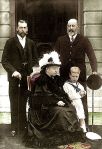11 January
2011
Frank Field Reports: Time for a Parenting GCSE?
Posted in British Politics, Culture, Education, Marriage & Family, Public Policy
Frank Field, the MP chosen to be the government’s so-called ‘poverty czar’, has recommended, in his much-anticipated report on poverty and life chances, that schools should offer parenting GCSEs in an attempt to curb widespread family breakdown in the UK.
Readers may feel that this is a faintly ridiculous suggestion, or perhaps a step too far, without being sure why. It is perhaps useful to go back to basics to see what is wrong with Frank Field’s idea.
We have argued before on this blog that education is directed towards the development of the whole person, particularly the inculcation of virtue. There is a danger when positing this truth, however, because the monopoly which the State has gained over scholastic education has meant that ‘education’ and ‘schooling’ have now become synonymous in the minds of many people. Thus, the wisdom of citizenship classes and lessons in hygiene can be inferred directly from the fact that citizenship and hygiene are things which young people need to know about. Yet it is necessary to distinguish between the purpose of education and the purpose of schooling.
The Oxford Dictionary defines education as ‘the process of nourishing or rearing’, whilst to educate is to ‘bring up (children) so as to form their habits, manners, intellectual aptitudes, etc’. Schooling – the formal academic training given in schools and colleges – is a particular aspect of education, but it does not exhaust the definition of education, nor is it even the most important aspect. To school a child is not to educate him, although it is part of doing so. It simply does not follow that because something is important and we need to know about, that we should be taught about in school.
When education is considered in this truer and more complete sense, it becomes clear that parents – rather than the State – are the primary educators of children. It is within the family that children receive their vital formation in ‘habits, manners, intellectual aptitudes’ and so on. This truth is recognised in our legal system which, although it compels parents to fulfil their duty as educators, recognises their liberty to choose the means of doing so. Schools have been traditionally understood to be standing in loco parentis rather than in loco regis, which is to say that a teacher is primarily accountable to parents, and is not a civil servant carrying out the bidding of the State.
The proper role of a school is to assist parents in their duty of education by providing technical tuition in academic matters, since the knowledge of a wide variety of subjects will often be beyond the resources of parents. The State enters into the picture to help parents provide a more complex scholastic formation than they can generally provide alone, but this is where the role of the State begins and ends. Parenting skills, hygiene, citizenship, household budgeting, sex and relationships: schools simply have no business talking to children about such things.
The present writer does not deny that there is a chronic problem of family breakdown in Britain. There is, and bad parenting has much to do with it. It is tempting, therefore, for those who uphold the importance of traditional family values to look to the State for a quick fix. But we should question whether the State – particularly in its current form – is capable of providing the solution needed. Frank Field rails against ‘toerag parents’, but what is the track record of the government when it comes to parenting? Children in State care generally have poorer health, finish school with fewer qualifications, and are more likely to suffer from mental health problems. This is not a slur on children in care, and it is not to infer that these problems are caused by State care. Often by the time children are taken into care they already have various problems which need to be resolved. Yet if the State has proved incapable, in many cases, of helping these children resolve their problems, why should we believe that it has something useful to teach the rest of us in the way of parenting skills?
Frank Field has done us a service by highlighting a problem to which most politicians are afraid to draw attention, namely, that the family has been thrown into chaos by ‘liberal attitudes to sex, the expansion of the welfare state, the disappearance of guiding authority figures such as church leaders and the loss of so much heavy industry, which once employed millions of working-class young men’. He has courageously lauded the values of the Victorian era in which ‘the social fabric of our country underwent a remarkable transformation’. Yet, though he has correctly identified the problem, his statist solution of using parenting classes to help ‘build a better society’ is nothing but a dangerous fantasy. It is a fantasy because it ignores the overriding need for moral formation, and for a real sea change in society, in favour of the teaching of ‘skills’ – a cheap solution doomed to failure. It is dangerous because what may begin as an altruistic attempt to give struggling parents a helping hand may quickly become a means of social engineering whereby anyone refusing to raise their children according to the arbitrary diktats of the State may be deemed unfit to be a parent.
(Photo of Queen Victoria with Princes George, Albert, and Edward: CC: © Peter symonds. No endorsement implied.)
Readers may feel that this is a faintly ridiculous suggestion, or perhaps a step too far, without being sure why. It is perhaps useful to go back to basics to see what is wrong with Frank Field’s suggestion.
We have argued before on this blog that education is directed towards the development of the whole person, particularly the inculcation of virtue. There is a danger when positing this truth, however, because the monopoly which the State has gained over scholastic education has meant that ‘education’ and ‘schooling’ have now become synonymous in the minds of many people. Thus, the wisdom of citizenship classes and lessons in hygiene can be inferred directly from the fact that citizenship and hygiene are things which young people need to know about. Yet it is necessary to distinguish between the purpose of education and the purpose of schooling.
The Oxford Dictionary defines education as ‘the process of nourishing or rearing’, whilst to educate is to ‘bring up (children) so as to form their habits, manners, intellectual aptitudes, etc’. Schooling – the academic training given in schools and colleges – is a particular aspect of education, but it does not exhaust the definition of education, nor is it even the most important aspect. To school a child is not to educate him, although it is part of doing so. It simply does not follow that because something is important and we need to know about, that we should be taught about in school.
When education is considered in this truer and more complete sense, it becomes clear that parents – rather than the State – are the primary educators of children. It is within the family that children receive their vital formation in ‘habits, manners, intellectual aptitudes’ and so on. This truth is recognised in our legal system which, although it compels parents to fulfil their duty as educators, recognises their liberty to choose the means of doing so. Schools have been traditionally understood to be standing in loco parentis rather than in loco regis, which is to say that a teacher is primarily accountable to parents, and is not a civil servant carrying out the bidding of the State.
The proper role of a school is to assist parents in their duty of education by providing technical tuition in academic matters, since the knowledge of a wide variety of subjects will often be beyond the resources of parents. The State enters into the picture to help parents provide a more complex scholastic formation than they can generally provide alone, but this is where the role of the State begins and ends. Parenting skills, hygiene, citizenship, household budgeting, sex and relationships: schools simply have no business talking to children about such things.
The present writer does not deny that there is a chronic problem of family breakdown in Britain. There is, and bad parenting has much to do with it. It is tempting, therefore, for those who uphold the importance of traditional family values to look to the State for a quick fix. But we should question whether the State – particularly in its current form – is capable of providing the solution needed. Frank Field rails against ‘toerag parents’, but what is the track record of the government when it comes to parenting? Children in State care generally have poorer health, finish school with fewer qualifications, and are more likely to suffer from mental health problems. This is not a slur on children in care, and it is not to infer that these problems are caused by State care. Often by the time children are taken into care they already have various problems which need to be resolved. Yet if the State has proved incapable, in many cases, of helping these children resolve their problems, why should we believe that it has something useful to teach the rest of us in the way of parenting skills?
Frank Field has done us a service by highlighting a problem to which most politicians are afraid to draw attention, namely, that the family has been thrown into chaos by ‘liberal attitudes to sex, the expansion of the welfare state, the disappearance of guiding authority figures such as church leaders and the loss of so much heavy industry, which once employed millions of working-class young men’. He has courageously lauded the values of the Victorian era in which ‘the social fabric of our country underwent a remarkable transformation’. Yet, though he has correctly identified the problem, his statist pipedream that parenting classes will help us to ‘build a better society’ is nothing but a dangerous fantasy. It is a fantasy because it ignores the overriding need for moral formation, and for a real sea change in society, in favour of the teaching of ‘skills’ – a cheap solution doomed to failure. It is dangerous because what may begin as an altruistic attempt to give struggling parents a helping hand may quickly become a means of social engineering whereby anyone refusing to raise their children according to the arbitrary diktats of the State may be deemed unfit to be a parent.


Leave a Reply